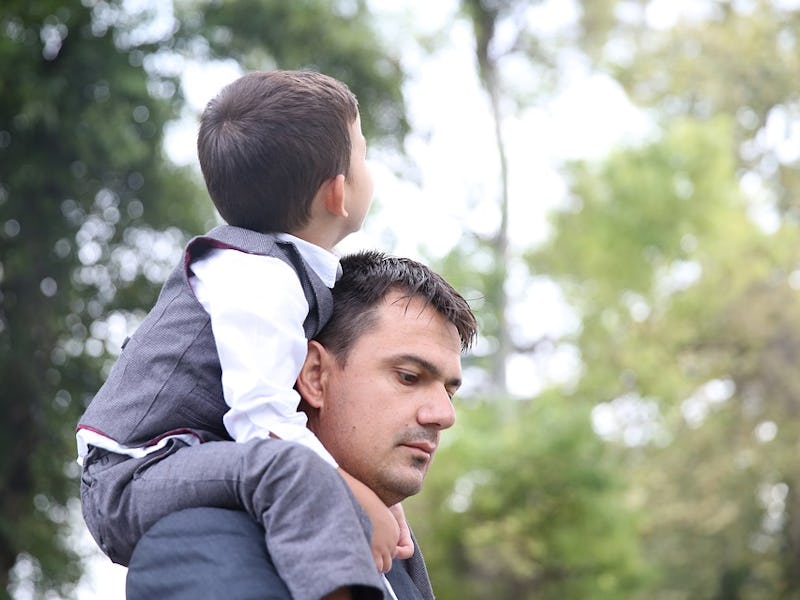Science Has Good News for Dads Who Ditch Stereotypes
'Fathers continue to navigate changing social expectations.'

While the workload between heterosexual parents is not spread evenly, polling shows that dads have become more involved with childcare than they were 50 years ago. Importantly, a new study reveals that this uptick in involvement also comes with a shift in thinking about masculinity. The two are intrinsically entwined: Fathers who understand that being a dad doesn’t mean conforming to traditional masculinity are the same as those who spend more time with their children.
In a paper released Monday in the Journal of Marriage and Family sociologists from Brigham Young and Ball State Universities make the case that the way dads take care of their kids is directly shaped by their definition of masculinity. Overall their analysis reveals that, on average, dads are spending more time with their children and are acting more openly loving towards them. This group of dads also see themselves as caretakers who are playing an equally important role to mothers.
“Fathers continue to navigate changing social expectations,” co-author and BYU graduate student Lee Essig explained in a statement released Monday. “As current social trends are pushing for men’s increased familial involvement, we see more fathers stepping up to engage more actively in their children’s lives in various ways.”
Dads who define fatherhood less traditionally spend more time with their children.
These conclusions are based off a survey of 2,194 fathers who have children between the ages of two and 18. The researchers asked the fathers a series of questions designed to reveal their perception of negative masculine behaviors, like the need to be an authoritarian tough-guy. For example, one of the statements dads were asked to respond to was, “It is difficult for men to express warm and tender affectionate feelings towards children.”
They then analyzed those responses alongside survey questions that probed how the dads felt about their children and how often they spent time with them.
When it came to dads who adhere more to masculine norms, the researcher founds that they were less likely to embrace “the new fatherhood ideal.” These dads were less likely to be involved in child-rearing, and more likely to “engage in harsh discipline.” On the other side, dads who were traditional “less masculine” were more involved and more expressive in their loving emotions.
There were also some interesting takeaways when it came to the ages of children and how that relates to fathers who belonged in the more involved group. The fathers of older children reported that they “generally agreed that their child turns to them for emotional support” and reported that they “acted warm toward their child between often and always.” Fathers of the younger children said that they that “engaged with them several times a week” — which, is a low bar to pass but that tells you something about society.
Father and son.
The study authors say this new paper adds to a growing body of research paints a portrait of changing American fatherhood. Notably, fathers who are closer to their children aren’t just casting off bad norms — they are positively affecting the health of their children. Studies show that infants who spend time with their dad get a boost in mental development, kids with involved dads are less likely to grow up to be homeless, and fatherhood involvement is linked to a smaller chance of childhood obesity. Even something as simple as fathers reading to their children has been connected to a smaller chance of developing psychological problems.
Involved fathers, the study authors also note, also teach their sons that they can live by their own definitions of healthy masculinity.
“As we teach boys and men to be more emotionally aware and cultivate emotional well-being, these men and boys will be able to become better fathers for their children,” says Essig, “as they will be able to provide for them not only through financial contributions, but by being emotionally and mentally present for their children and their wellbeing.”